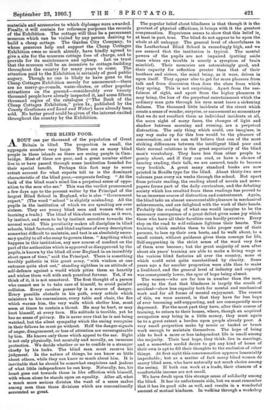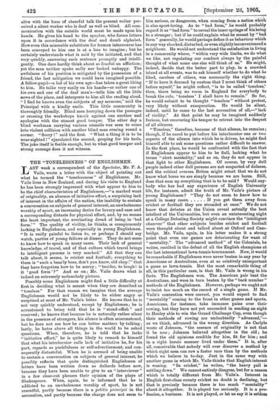A BOUT one per thousand of the population of Great Britain
is blind. The proportion is small, the aggregate number very large. There are as many blind people in these islands as there are seeing people in Cam- bridge. Most of these are poor, and a great number either live in or have passed through some institution founded for their special benefit. Perhaps this fact may to some extent account for what experts tell us is the dominant characteristic of the blind poor,—corporate feeling. "At the back of the blind man's mind lies a perpetual sense of oppo- sition to the men who see." This was the verdict pronounced a few days ago to the present writer by the Principal of the largest Blind School in England, who is also " Government expert." (The word " school " is slightly misleading. All the pupils in the institution of which we are speaking are over sixteen. They are young blind men and women who are learning a trade.) The blind of this class combine, as it were, by instinct, and seem to be by instinct secretive towards the normal world. This peculiarity makes all discipline in blind schools, blind factories, and blind asylums of every description somewhat difficult to maintain, and tact is an absolutely neces- sary quality to all who essay to govern them. " Anything which happens in this institution, any new course of conduct on the part of the authorities which is approved or disapproved by the pupils, is known by the blind all over England in an incredibly short space of time," said the Principal. There is something terribly pathetic in this great army, "with wisdom at one entrance quite shut out," standing sightless in an attitude of self-defence against a world which pities them so heartily and wishes them well with such practical fervour. Yet, if we think of it, it is not unnatural. The first thought of a person who cannot see is to take care of himself, to avoid painful collision. Every careless passer-by is a source of danger. Every possible obstacle in his path, every article which ministers to his convenience, every table and chair, the fire which warms him, the very walls which shelter him, must seem at times to contain a threat. He may be hurt, or may hurt himself, at every turn. His solitude is terrible, yet he has no sense of privacy. He is never sure that he is not being watched, but the silent sympathy which the seeing recognise in theirfellows he must go without. Half the danger-signals of anger, disagreement, or loss of attention are unrecognisable by him. He knows only those which appeal to the ear. Sight is not only physically, but mentally and morally, an immense protection. We decide whether or no to confide in a stranger chiefly by his looks. The blind man must reserve his judgment. In the nature of things, he can know so little about others, while they can know so much about him. It is inevitable that he should be somewhat suspicious and jealous of what little independence he can keep. Naturally, too, his heart goes out towards those in like affliction with himself, with whom alone he stands upon an equality. After all, what a much more serious division the want of a sense makes among men than those divisions which are conventionally accounted so great.
The popular belief about blindness is that though it is the greatest of physical afflictions, it brings with it the greatest compensation. Experience seems to show that this belief is, at least in part, true. The blind do not appear to be upon the whole at all unhappy. The general level of cheerfulness in the Leatherhead Blind School is exceedingly high, and we are assured that the institution is typical. The mental powers of the pupils are not impaired (putting aside cases where eye trouble is merely a symptom of brain mischief). Their memories are astonishingly good, and their capacity for reflection greater than that of their brothers and sisters, the mind being, as it were, driven in upon itself. They appear also to get far more pleasure from talk and from discussion than does the class from which they spring. This is not surprising. Apart from the use- fulness of sight, and apart from the higher pleasures it may bring, the loss of the perpetual entertainment which the ordinary man gets through his eyes must leave a sickening dulness. The thousand little incidents of the street which create a sense of wonder, surprise, or amusement so momentary that we do not recollect them as individual incidents at all, the mere sight of many faces, the changes of light and shadow between morning and evening, are a perpetual distraction. The only thing which could, one imagines, in any way make up for this loss would be the pleasure of conversation, and we can well believe that one of the most striking differences between the intelligent blind poor and their normal relations is the great superiority of the blind man's vocabulary. They have less than other people to gossip about, and if they can read, or have a chance of hearing reading, their talk, we are assured, tends to become very bookish. A great many standard books are now printed in Braille type for the blind. About thirty-two new volumes pass every six weeks through the schooL But apart from private reading, the reading aloud of novels and news- papers forms part of the daily curriculum, and the debating society which has resulted from these readings has proved to be an immense source of distraction and contentment. Again, the blind take an almost unaccountable pleasure in mechanical achievements, and are delighted with the work of their hands. Probably the evading of what one would imagine to be the necessary consequence of a great defect gives some joy which those who have all their faculties can hardly perceive. Every step on the road to self-reliance lightens their hearts. The training which enables them to take proper care of their persons, to lace up their own boots, and to walk about, to a small extent, without guidance gives them courage for life, Self-supporting in the strict sense of the word very few of them ever become ; but the great majority of men after about six years' training are able to make a living wage at the various blind factories all over the country, none ot which could exist quite unsubsidised by charity. Some years ago a far smaller proportion were able thus to make a livelihood, and the general level of industry and capacity was consequently lower, the spur of hope being absent.
The women—who are far less in number than the men, owing to the fact that blindness is largely the result of accident—show less capacity both for mental and mechanical work and for all forms of mental enjoyment. The reason of this, we were assured, is that they have far less hope of ever becoming self-supporting, and are consequently more depressed. For the most part they have, after their course of training, to return to their homes, where, though an acquired occupation may bring in a little money, they must again be to a great extent a burden upon people already poor. A very small proportion make by music or basket or brush work enough to maintain themselves. The hope of being able to lead a more or less independent life is small among the majority. Their best hope, they think, lies in marriage, and a somewhat sordid desire to get any kind of home of their own is apt to fill their thoughts to the exclusion of other things. At first sight this} consummation appears lamentably improbable ; but as a matter of fact many blind women do marry blind men, who have naturally not much choice among the seeing. If both can work at a trade, their chances of a comforta,ble income are not small.
We have dwelt upon this strange sense of solidarity among the blind. It has its unfortunate side, but we must remember that it has its good side as well, and results in a wonderful amount of mutual kindness. In walking through a workshop alive with the hum of cheerful talk the present writer per- ceived a silent worker who is deaf as well as blind. All com- munication with the outside world must be made upon his hands. He gives his hand to the speaker, who forms letters upon it in accordance with the deaf and dumb alphabet. How even this miserable substitute for human intercourse has been conveyed to him one is at a loss to imagine ; but he certainly understands what is said by the initiated, and that very quickly, answering each sentence promptly and intelli- gently. One dare hardly think about so fearful an affliction; yet the man neither spoke sadly nor looked unhappy. The awfulness of his position is mitigated by the possession of a friend, the last mitigation we could have imagined possible. A fellow-pupil—a lad of his own age—has taken a great liking to him. He talks very easily on his hands—or rather one of his own and one of the deaf man's—tells him all the little news of the place, and interprets to him all the reading aloud. " I find he knows even the subjects of my sermons," said the Principal with a kindly smile. This little community is thoroughly friendly. Blind men hurrying down the passages or crossing the workshops knock against one another and apologise with the utmost good temper. The other day a blind workman carrying various utensils was seen to come into violent collision with another blind man coming round a corner. " Sorry !" said the first. " What a thing it is to be near-sighted !" ejaculated the second, groping for his tools. The joke itself is feeble enough, but to what good temper and strong courage does it not witness.











































 Previous page
Previous page